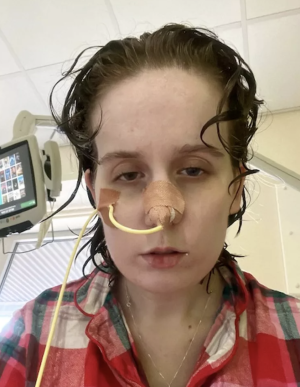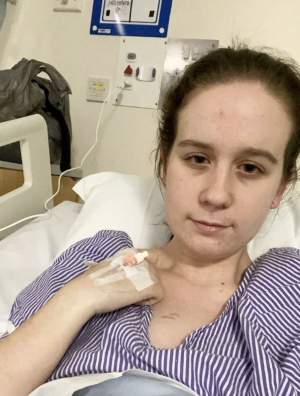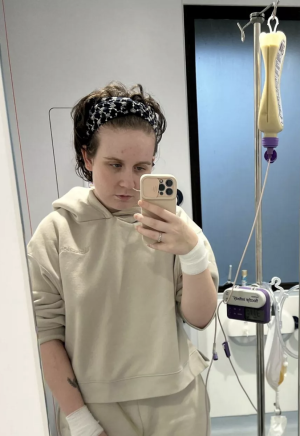She couldn’t pee for six years—here’s what finally gave her answers
By
Veronica E.
- Replies 0
Imagine waking up one day and discovering your body no longer does something as basic as urinating—and no one can explain why.
That’s exactly what happened to 27-year-old Anna Gray, who went from living a normal life to navigating daily routines most never think twice about.
Her experience offers a deeply human look into how rare conditions can impact not just the body, but a person's confidence, mental health, and sense of self.
Anna, from Bath, England, lives with Fowler’s syndrome—a rare condition that left her unable to urinate naturally for six years.
Though her story is extraordinary, it also highlights the challenges many people face when dealing with health concerns that are difficult to diagnose and poorly understood.

Her ordeal began in December 2018, when she suddenly found herself unable to urinate despite repeated attempts.
For days, she tried everything from warm baths to the sound of running water, hoping it would help—but nothing worked.
"It was difficult to get doctors to believe me," Anna shared in an interview with Metro.
Some suggested she was simply mistaken.
This skepticism delayed her diagnosis and left her feeling isolated.
The situation worsened as the pain in her bladder became unbearable.
Eventually, scans revealed that her bladder was dangerously full—holding nearly four times the typical capacity.
To relieve the pressure, doctors inserted a catheter, a device she would come to rely on daily.
After nearly a year of hospital visits and pushing for more testing, Anna was finally diagnosed with Fowler’s syndrome in October 2019.
The condition affects the urethral sphincter, a muscle that must relax for urine to flow.
In Fowler’s syndrome, the muscle fails to do so, preventing urination and causing significant pain and discomfort.
The diagnosis was bittersweet.
While it validated her experience, doctors told Anna her bladder showed no activity and would likely "never work normally again."

Anna now self-catheterizes five times a day.
It’s a routine she’s learned to manage, though not without difficulty.
Infections are common, and the emotional toll has been heavy.
Still, she’s found ways to reclaim her confidence.

"I’m slowly getting there, and now I’m used to the bag. I’ll wear shorts and tops where you can see it—it doesn’t bother me anymore," she said.
Anna also found comfort and connection by reaching out to others with the same condition.
"At first I thought I must be the only person in the world who was going through something like this," she recalled.
But she describes the online community she found as "incredible."
Fowler’s syndrome is not well-known and is often misunderstood—even by medical professionals.
Anna hopes her openness will bring more awareness and empathy to those dealing with rare or invisible health challenges.
Her story is a reminder of how important it is to listen to patients, to advocate for answers, and to support one another—especially when a diagnosis is elusive or life-altering.
Read next: This woman thought she had a common cold—you won’t believe what doctors found inside her head!

Have you or someone you know experienced a rare or difficult-to-diagnose condition? How did you find support? Share your story in the comments and help us build a community of strength, compassion, and shared understanding.
That’s exactly what happened to 27-year-old Anna Gray, who went from living a normal life to navigating daily routines most never think twice about.
Her experience offers a deeply human look into how rare conditions can impact not just the body, but a person's confidence, mental health, and sense of self.
Anna, from Bath, England, lives with Fowler’s syndrome—a rare condition that left her unable to urinate naturally for six years.
Though her story is extraordinary, it also highlights the challenges many people face when dealing with health concerns that are difficult to diagnose and poorly understood.

Anna Gray’s journey with a rare condition has taken her through years of hospital visits, uncertainty, and ultimately, strength in advocacy. Image Source: People / Anna Gray/SWNS.
When symptoms are dismissed
Her ordeal began in December 2018, when she suddenly found herself unable to urinate despite repeated attempts.
For days, she tried everything from warm baths to the sound of running water, hoping it would help—but nothing worked.
"It was difficult to get doctors to believe me," Anna shared in an interview with Metro.
Some suggested she was simply mistaken.
This skepticism delayed her diagnosis and left her feeling isolated.
The situation worsened as the pain in her bladder became unbearable.
Eventually, scans revealed that her bladder was dangerously full—holding nearly four times the typical capacity.
To relieve the pressure, doctors inserted a catheter, a device she would come to rely on daily.
Also read: A mom of six ignored these 4 symptoms—what she learned about cancer could save lives
The long-awaited diagnosis
After nearly a year of hospital visits and pushing for more testing, Anna was finally diagnosed with Fowler’s syndrome in October 2019.
The condition affects the urethral sphincter, a muscle that must relax for urine to flow.
In Fowler’s syndrome, the muscle fails to do so, preventing urination and causing significant pain and discomfort.
The diagnosis was bittersweet.
While it validated her experience, doctors told Anna her bladder showed no activity and would likely "never work normally again."

Living with a rare diagnosis, Anna Gray continues to share her story to raise awareness and support others facing similar challenges. Image Source: People / Anna Gray/SWNS.
Also read: See how Wendy Williams, 60, defies dementia with her stunning smile in a rare public appearance!
A new kind of normal
Anna now self-catheterizes five times a day.
It’s a routine she’s learned to manage, though not without difficulty.
Infections are common, and the emotional toll has been heavy.
Still, she’s found ways to reclaim her confidence.

Anna Gray now self-catheterizes multiple times a day—an essential part of managing her condition and reclaiming her independence. Image Source: People / Anna Gray/SWNS.
Also read: Discover the symptoms of hypothyroidism that you can't afford to ignore
"I’m slowly getting there, and now I’m used to the bag. I’ll wear shorts and tops where you can see it—it doesn’t bother me anymore," she said.
Anna also found comfort and connection by reaching out to others with the same condition.
"At first I thought I must be the only person in the world who was going through something like this," she recalled.
But she describes the online community she found as "incredible."
Fowler’s syndrome is not well-known and is often misunderstood—even by medical professionals.
Anna hopes her openness will bring more awareness and empathy to those dealing with rare or invisible health challenges.
Her story is a reminder of how important it is to listen to patients, to advocate for answers, and to support one another—especially when a diagnosis is elusive or life-altering.
Read next: This woman thought she had a common cold—you won’t believe what doctors found inside her head!
Key Takeaways
- A 27-year-old woman named Anna Gray has been diagnosed with a rare disorder called Fowler's syndrome, which prevents her from urinating naturally.
- For the past six years, Gray has relied on a catheter to manually relieve her bladder.
- Initially, she struggled to get a diagnosis as doctors were skeptical about her symptoms.
- She was eventually diagnosed and now manages her condition with daily self-catheterization and support from an online community of others with Fowler's syndrome.
Have you or someone you know experienced a rare or difficult-to-diagnose condition? How did you find support? Share your story in the comments and help us build a community of strength, compassion, and shared understanding.






